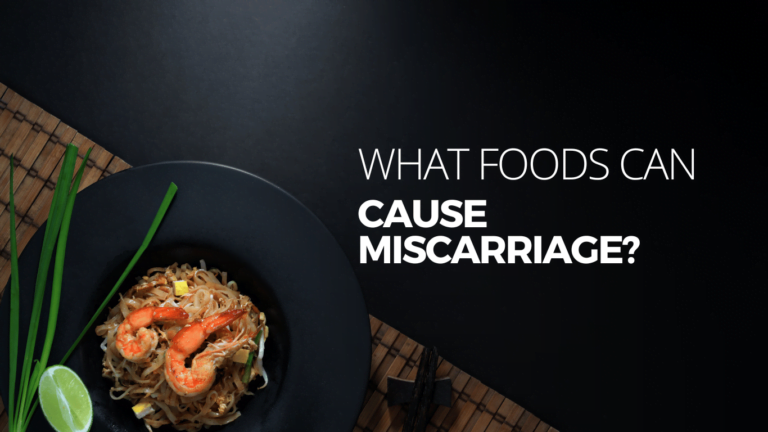Pregnancy is an exciting and transformative time in a woman’s life. However, it also comes with a myriad of concerns, especially regarding diet. With countless dos and don’ts floating around, it’s easy to feel overwhelmed. This blog post aims to guide expecting mothers through the maze of food choices, highlighting those that could potentially cause miscarriages and the reasons behind these recommendations.
Why Diet Matters During Pregnancy
A healthy diet is crucial during pregnancy, not just for the mother’s well-being but also for the baby’s development. The food you consume provides the essential nutrients required for growth, brain development, and overall health. It’s important to understand that some foods can pose risks, including increasing the chances of miscarriage.
Understanding Miscarriage Risks
Miscarriages are often caused by chromosomal abnormalities, but diet can also play a role. Certain foods may contain harmful bacteria, toxins, or high levels of specific nutrients that could contribute to complications. Being aware of these foods helps in making informed dietary choices.
Raw and Undercooked Meat
The Dangers of Toxoplasmosis
Raw or undercooked meat can be contaminated with Toxoplasma gondii, a parasite that causes toxoplasmosis. This infection can lead to serious complications, including miscarriage. Always ensure your meat is cooked thoroughly.
Avoiding Deli Meats
Deli meats, unless heated to steaming hot, can harbor Listeria, a bacteria that can cross the placenta and lead to infection or miscarriage. It’s best to avoid cold cuts during pregnancy, or reheat them before consumption.
Risks from Raw Seafood
Sushi lovers, take note. Raw seafood can also be a source of harmful bacteria and parasites. It’s advisable to stick to cooked fish and seafood to avoid these risks.
Unpasteurized Dairy Products
The Listeria Threat
Similar to deli meats, unpasteurized dairy products like certain cheeses (brie, feta, camembert) can contain Listeria. Opt for pasteurized versions to ensure safety.
Nutrient Imbalances
While dairy is a good source of calcium, unregulated consumption of unpasteurized products can lead to nutrient imbalances harmful to both mother and baby.
Safer Alternatives
Choose pasteurized milk, cheese, and yogurt. They provide the same nutrients without the associated risks.
Certain Fish and Seafood
High Mercury Levels
Fish like swordfish, king mackerel, and shark are high in mercury, a heavy metal that can harm a developing baby’s nervous system. Limit your intake of these fish.
Safe Seafood Options
Opt for low-mercury fish like salmon, sardines, and trout. They are rich in omega-3 fatty acids, which are beneficial for fetal brain development.
The Role of Omega-3
Omega-3 fatty acids are crucial but should be sourced from safe, low-mercury fish or supplements specifically designed for pregnant women.
Raw Eggs
Salmonella Risks
Raw or undercooked eggs can be contaminated with Salmonella, leading to food poisoning. Symptoms like vomiting and diarrhea can be severe and potentially harmful during pregnancy.
Hidden Sources of Raw Eggs
Be cautious with foods like homemade mayonnaise, Caesar dressing, and certain desserts like mousse and tiramisu, which may contain raw eggs.
Safe Egg Consumption
Ensure eggs are well-cooked, with both yolk and white firm. Opt for pasteurized eggs for recipes that require raw eggs.
Caffeine Consumption
Moderation is Key
High caffeine intake is linked to an increased risk of miscarriage. Limit your daily intake to 200 milligrams, roughly one 12-ounce cup of coffee.
Hidden Caffeine Sources
Remember that caffeine is also present in tea, chocolate, and some medications. Keep track of your overall consumption.
Decaffeinated Alternatives
Opt for decaffeinated coffee and tea. Herbal teas like ginger or peppermint can be soothing and safe alternatives.
Alcohol
Absolute No-No
Alcohol consumption during pregnancy is linked to miscarriages and fetal alcohol syndrome. It’s best to avoid alcohol entirely.
Social Situations
If you find yourself in social settings where alcohol is present, opt for non-alcoholic beverages or mocktails.
Long-Term Impact
Even small amounts of alcohol can have long-term effects on the baby’s health and development.
Unwashed Fruits and Vegetables
Pesticide Concerns
Unwashed fruits and vegetables can carry pesticides and harmful bacteria. Always wash them thoroughly before consumption.
Risk of Toxoplasmosis
Toxoplasma gondii can also be present on unwashed produce. Thorough washing reduces this risk significantly.
Safe Practices
Use a vegetable brush and wash produce under running water. For extra safety, consider peeling fruits and vegetables.
Herbal Teas and Supplements
Not All Are Safe
While some herbal teas can be beneficial, others like nettle leaf, chamomile, and red raspberry leaf can cause contractions or other complications.
Consult Your Doctor
Always consult your healthcare provider before taking any herbal teas or supplements during pregnancy.
Safe Herbal Options
Ginger and peppermint teas are generally considered safe and can help with nausea and digestion.
Processed Junk Food
Nutrient Deficiency
Processed junk foods are often high in sugar and unhealthy fats, leading to nutrient deficiencies that can affect pregnancy.
Weight Management
Excessive weight gain during pregnancy can lead to complications like gestational diabetes and hypertension.
Healthier Snacking
Opt for nutrient-dense snacks like nuts, fruits, and whole grains to keep both mother and baby healthy.
Conclusion
Navigating dietary choices during pregnancy can be challenging, but being informed is the first step towards ensuring a safe and healthy pregnancy. By avoiding certain risky foods, you can minimize the chances of complications, including miscarriage. Remember, it’s always best to consult with your healthcare provider for personalized advice.
For more information on pregnancy complications and what to look out for, you can visit our detailed guide on pregnancy complications. This resource provides comprehensive insights on various issues that might arise during pregnancy and how to manage them.
Join Our Community!
Are you looking for support, advice, or just a friendly chat about pregnancy and parenting? Join our community on Facebook! Connect with other parents, share your experiences, and get answers to all your questions.
For additional tips on maintaining a balanced diet during pregnancy, consider checking out more resources from authoritative health websites. One such resource is the American Pregnancy Association which offers extensive information on nutrition, prenatal care, and overall pregnancy health.


Comments are closed.